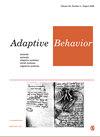将模仿和深度强化学习结合起来,在虚拟觅食任务中实现人类水平的表现
IF 1.3
4区 计算机科学
Q4 COMPUTER SCIENCE, ARTIFICIAL INTELLIGENCE
引用次数: 1
摘要
我们开发了一个框架来学习使用人类数据的生物启发觅食政策。我们进行了一个实验,让人类沉浸在一个开阔的野外觅食环境中,并接受训练,以收集最高数量的奖励。引入马尔可夫决策过程(MDP)框架对人类决策动力学进行建模。然后,基于最大似然估计的模仿学习(IL)用于训练神经网络(NN),将人类决策映射到观察状态。结果表明,被动模仿在很大程度上落后于人类。我们使用策略上近端策略优化(PPO)算法通过强化学习(RL)进一步改进人类启发的策略,该算法比其他算法具有更好的稳定性,并且可以稳定地改进使用IL预训练的策略。我们表明,IL和RL的组合与人类的表现相匹配,并且用我们的方法训练的人工智能体可以快速适应奖励分布的变化。我们最后表明,奖励分布转移的良好性能和鲁棒性强烈依赖于将非中心信息与环境的自我中心表示相结合。本文章由计算机程序翻译,如有差异,请以英文原文为准。
Combining imitation and deep reinforcement learning to human-level performance on a virtual foraging task
We develop a framework to learn bio-inspired foraging policies using human data. We conduct an experiment where humans are virtually immersed in an open field foraging environment and are trained to collect the highest amount of rewards. A Markov Decision Process (MDP) framework is introduced to model the human decision dynamics. Then, Imitation Learning (IL) based on maximum likelihood estimation is used to train Neural Networks (NN) that map human decisions to observed states. The results show that passive imitation substantially underperforms humans. We further refine the human-inspired policies via Reinforcement Learning (RL) using the on-policy Proximal Policy Optimization (PPO) algorithm which shows better stability than other algorithms and can steadily improve the policies pre-trained with IL. We show that the combination of IL and RL match human performance and that the artificial agents trained with our approach can quickly adapt to reward distribution shift. We finally show that good performance and robustness to reward distribution shift strongly depend on combining allocentric information with an egocentric representation of the environment.
求助全文
通过发布文献求助,成功后即可免费获取论文全文。
去求助
来源期刊

Adaptive Behavior
工程技术-计算机:人工智能
CiteScore
4.30
自引率
18.80%
发文量
34
审稿时长
>12 weeks
期刊介绍:
_Adaptive Behavior_ publishes articles on adaptive behaviour in living organisms and autonomous artificial systems. The official journal of the _International Society of Adaptive Behavior_, _Adaptive Behavior_, addresses topics such as perception and motor control, embodied cognition, learning and evolution, neural mechanisms, artificial intelligence, behavioral sequences, motivation and emotion, characterization of environments, decision making, collective and social behavior, navigation, foraging, communication and signalling.
Print ISSN: 1059-7123
 求助内容:
求助内容: 应助结果提醒方式:
应助结果提醒方式:


